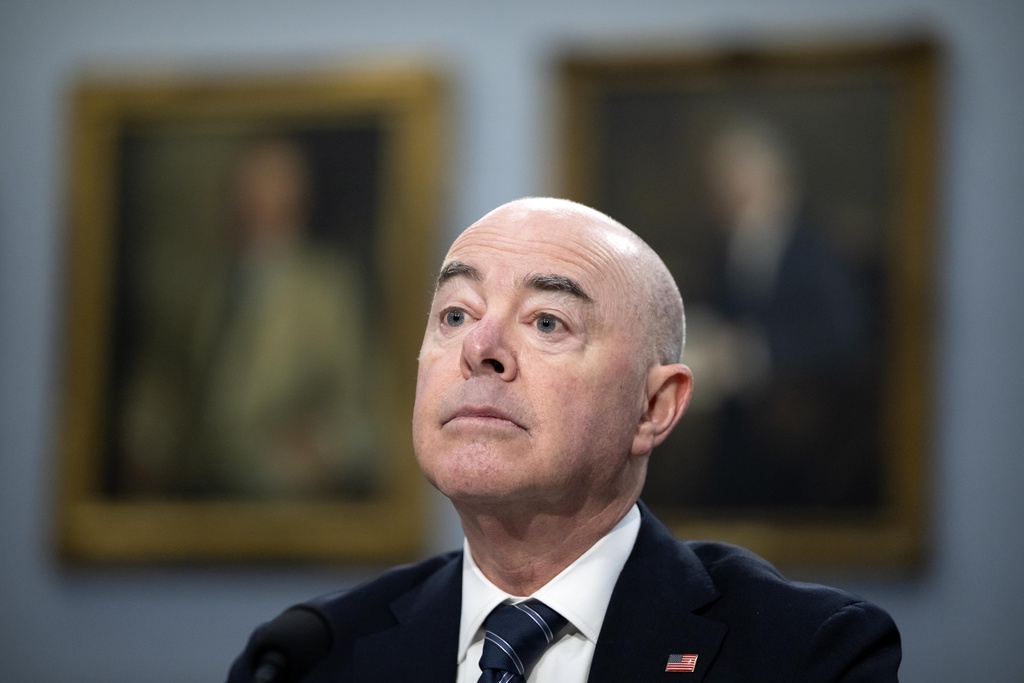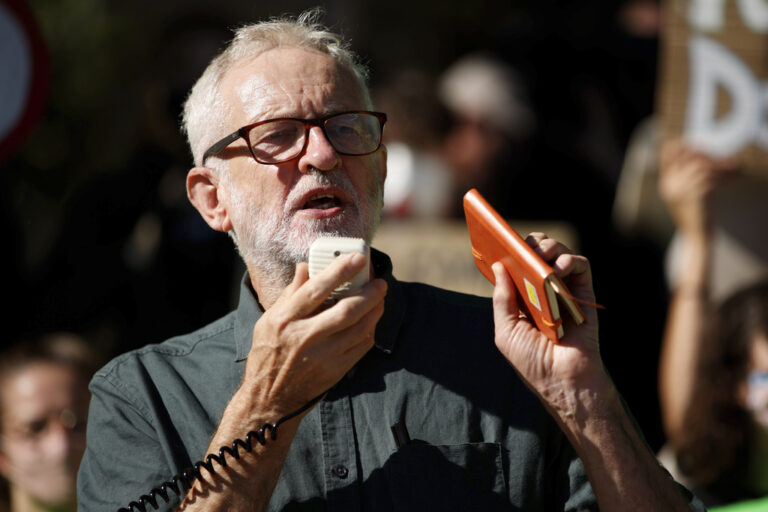House Speaker Mike Johnson says he is sending impeachment charges against Alejandro Mayorkas to the Senate on Tuesday, forcing senators to convene a trial on the allegations that the Homeland Security secretary has “willfully and systematically” refused to enforce existing immigration laws. But the proceedings may not last long.
While the Senate is obligated to convene a trial under the rules of impeachment once the charges are walked across the Capitol, Democrats are expected to try to dismiss or table the charges before the arguments get underway.
Majority Democrats have said the GOP case against Mayorkas doesn’t rise to the “high crimes and misdemeanors” laid out as a bar for impeachment in the Constitution, and Senate Majority Leader Chuck Schumer, D-N.Y., likely has enough votes to end the trial immediately if he decides to do so. The proceedings will not begin until Wednesday.
Opening the Senate for the week, Schumer said he wants to “address this issue as expeditiously as possible.”
“Impeachment should never be used to settle a policy disagreement,” Schumer said. “That would set a horrible precedent for the Congress.”
Senators will be sworn in Wednesday as jurors, turning the chamber into the court of impeachment. The Senate will then issue a summons to Mayorkas to inform him of the charges and ask for a written answer. He will not have to appear in the Senate at any point.
What happens after that is is unclear. Impeachment rules generally allow the Senate to decide how to proceed.
Republicans have argued there should be a full trial. As Johnson signed the articles Monday in preparation for sending them across the Capitol, he said Schumer should hold a trial to “hold those who engineered this crisis to full account.”
“Senator Schumer is the only impediment to delivering accountability for the American people,” Johnson said. “Pursuant to the Constitution, the House demands a trial.”
The House narrowly voted in February to impeach Mayorkas for his handling of the border. House Republicans charged in two articles of impeachment that Mayorkas has not only refused to enforce existing law but also breached the public trust by lying to Congress and saying the border was secure. It was the first time in nearly 150 years a Cabinet secretary was impeached.
Since then, Johnson has delayed sending the articles to the Senate for weeks while both chambers finished work on government funding legislation and took a two-week recess. Johnson had said he would send them to the Senate last week, but punted again after Senate Republicans said they wanted more time to prepare.
South Dakota Sen. John Thune, the Senate’s No. 2 Republican, has said the Senate needs to hold a full trial where it can examine the evidence against Mayorkas and come to a final conclusion.
“This is an absolute debacle at the southern border,” Thune said. “It is a national security crisis. There needs to be accountability,” he said.
Schumer could call a vote to table the charges and end the trial as soon as Wednesday. Before a vote to dismiss, though, a group of House managers — members who act as prosecutors and are appointed by the speaker — will walk the articles across the Capitol and deliver the impeachment charges to be read on the Senate floor.
House Homeland Security Chairman Mark Green, a Tennessee Republican who is one of the impeachment managers, said earlier this month that he believes Democrats “have failed to meet the moment when it comes to ending this crisis and resolving the chaos at our borders.”
“Conducting an impeachment trial represents a unique opportunity to correct course,” he said.
Other impeachment managers appointed by Speaker Johnson are Michael McCaul of Texas, Andy Biggs of Arizona, Ben Cline of Virginia, Andrew Garbarino of New York, Michael Guest of Mississippi, Harriet Hageman of Wyoming, Clay Higgins of Louisiana, Laurel Lee of Florida, August Plfuger of Texas and Marjorie Taylor Greene of Georgia.
After the jurors are sworn in, Senate Republicans are likely to try to raise a series of objections if Schumer calls a vote to dismiss or table, an effort to both protest and delay the move. But ultimately they cannot block a dismissal if majority Democrats have the votes.
While most Republicans oppose quick dismissal, some have hinted they could vote with Democrats.
Sen. Mitt Romney, R-Utah, said last week he wasn’t sure what he would do if there were a move to dismiss the trial. “I think it’s virtually certain that there will not be the conviction of someone when the constitutional test has not been met,” he said.
At the same time, Romney said he wants to at least express his view that “Mayorkas has done a terrible job, but he’s following the direction of the president and has not met the constitutional test of a high crime or misdemeanor.”
In any case, Republicans would not be able to win the support of the two-thirds of the Senate that is needed to convict and remove Mayorkas from office. Democrats control the Senate, 51-49, and they appear to be united against the impeachment effort. Not a single House Democrat supported it, either.
Sen. Sherrod Brown, a Democrat who is facing a tough reelection bid in Ohio, called the impeachment trial a “distraction,” arguing that Republicans should instead support a bipartisan border compromise they scuttled earlier this year.
“Instead of doing this impeachment — the first one in 100 years — why are we not doing a bipartisan border deal?” he said.
If Democrats are not able to dismiss or table the articles, they could follow the precedent of several impeachment trials for federal judges over the last century and hold a vote to create a trial committee that would investigate the charges. While there is sufficient precedent for this approach, Democrats may prefer to end the process completely, especially in a presidential election year when immigration and border security are top issues.
If the Senate were to proceed to an impeachment trial, it would be the third in five years. Democrats impeached former President Donald Trump twice, once over his dealings with Ukraine and a second time in the days after the Jan. 6, 2021, attack on the Capitol. The Senate acquitted Trump bothtimes.
At a trial, senators would be forced to sit in their seats for the duration, maybe weeks, while the House impeachment managers and lawyers representing Mayorkas make their cases. The Senate is allowed to call witnesses, as well, if it so decides, and can ask questions of both sides after the opening arguments are finished.
Mayorkas told reporters last week he was not focused on the Senate proceedings. In a twist, he’ll be testifying about his budget request Tuesday to the same House committee that led the impeachment effort.
“It is my hope that my time is not taken away from my work,” Mayorkas said.
(AP)











